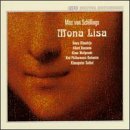| All Artists: Max von Schillings, Klauspeter Seibel, Kiel Philharmonic Orchestra, Kiev Philharmonic Orchestra, Albert Bonnema, Amy Lawrence, Beate Bilandzija, Bernd Gebhardt, Eva-Christine Reimer, Gerda Kosbahn, Jorg Sabrowski, Karsten Rua, Karsten Ruß, Klaus Wallprecht, Marek Gasztecki, Ulrich Koberle Title: Max von Schillings: Mona Lisa Members Wishing: 0 Total Copies: 0 Label: Cpo Records Release Date: 8/22/1995 Genre: Classical Styles: Opera & Classical Vocal, Historical Periods, Modern, 20th, & 21st Century Number of Discs: 2 SwapaCD Credits: 2 UPC: 761203930326 |
Search - Max von Schillings, Klauspeter Seibel, Kiel Philharmonic Orchestra :: Max von Schillings: Mona Lisa
 | Max von Schillings, Klauspeter Seibel, Kiel Philharmonic Orchestra Max von Schillings: Mona Lisa Genre: Classical
|
Larger Image |
CD Details |
CD ReviewsVerismo German style... Eric D. Anderson | South Bend, IN United States | 09/14/2003 (4 out of 5 stars) "I first listened to this opera after listening to a spate of works by Zemlinsky, Szymanowski, and early Schoenberg. In that context, Max von Schillings' music seemed to me somewhat artless. But I recently sat down and listened through again, libretto in hand, and I took away more appreciation for this little known figure of early twentieth century music.According to the notes, Schillings was part of Richard Strauss's circle, and produced a trio of very Wagnerian operas earlier in his career. "Mona Lisa" was his final and most popular effort. But stylistically it breaks away from a strictly Wagnerian mode, and dabbles in the language of Italian verismo. The story, too, fits the veristic model in it's direct, realistic, and slightly shocking handling of a love triangle ending in murder. It's given added interest by taking it's inspiration from Leonardo DaVinci's famous painting.Schilling's opera was one of four works that appeared in a very short time with very similar subjects--Zemlinsky's "Eine Florentinische Tragodie", Schreker's "Die Gezeichneten", and Korngold's "Violanta" to which it's similarity is striking. It's true that Schillings' harmonic and orchestral sophistication isn't quite up to the level of the other three, yet he still fashions a dynamic and effective drama that charms with it's beauty and chills with it's dramatic twists and turns." A fine performance of a fine work, but no masterpiece G.D. | Norway | 11/15/2009 (4 out of 5 stars) "Opinions seem to divide somewhat over Schillings's opera Mona Lisa, and I have seen people hail it as a masterpiece. It is an effective work with many fine things, but surely calling it a `masterpiece' must be hyperbole? It has in any case not fared particularly well on disc, despite the popularity it gained after its 1914 premiere, with this 1994 recording being (as far as I know) its only modern version (I have not heard the old Heger alternative). The cast assembled here might not contain many very familiar names, but if you are interested in investigating this curious and rather engaging opera, that shouldn't deter you - for the most part, the singing is thoroughly impressive, and the chorus and Kiel Philharmonic Orchestra are able to whip up some real power and flair under Klauspeter Seibel.
The plot is a rather bizarre one, concerning the private life of Mona Lisa, but the libretto is rather good anyway, and makes for some effective scenes. The drama is thus concentrated and effective, and Schillings manages to exploit this to keep the music flowing forward without getting too self-obsessed or cluttered. The musical style is definitely Wagnerian, with heavy use of leitmotifs and with the music flowing along, ebbing and swelling from climax to climax, but Schillings does indeed manage to put in some variation - the Carnival scene in the first movement is fresh and rhythmically lively, and there are touches of verismo and more lyrical melodrama. On the downside, the thematic material isn't always very distinguished and despite its forward momentum, it sometimes sounds as if Schillings doesn't quite know exactly where it is supposed to be going. But to Schillings's credit - despite the very Wagnerian influences, the music doesn't ever sound quite like Wagner, nor quite like any other opera I have ever heard, both in respect to style and atmosphere. It is also excellently scored, but like so many of his contemporaries the drive for orchestral effect might sometimes be a little wearisome and undermine the musical argument. Complete libretto and translation are included and the sound quality is pretty good. All in all, this is a recording very well worth investigating, especially for fans of late-romantic opera (if you like Zemlinsky or Schreker, say, chances are you'll like Schillings as well, even though the style is different enough and despite the fact that I wouldn't quite place Schillings in their league). Recommended" |

 Track Listings (10) - Disc #1
Track Listings (10) - Disc #1